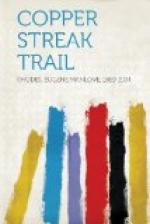Mr. Mitchell’s face was well shaped, not quite plump or pink, with the unlined curves, the smooth clear skin, and the rosy glow that comes from health and virtue, or from good living and massage. Despite fifty years, or near it, the flax-smooth hair held no glint of gray; his eyes, blue and big and wide, were sharp and bright, calm, confident, almost candid—not quite the last, because of a roving trick of clandestine observation; his mouth, where it might or should have curved—must once have curved in boyhood—was set and guarded, even in skillful smilings, by a long censorship of undesirable facts, material or otherwise to any possible issue.
Mr. Mitchell’s whole bearing was confident and assured; his step, for all those fifty afore-said years, was light and elastic, even in sauntering; he took the office stairs with the inimitable sprightly gallop of the town-bred.
Man is a quadruped who has learned to use his front legs for other things than walking. Some hold that he has learned to use his head. But there are three things man cannot do, and four which he cannot compass: to see, to think, to judge, and to act—to see the obvious; to think upon the thing seen; to judge between our own resultant and conflicting thoughts, with no furtive finger of desire to tip the balance; and to act upon that judgment without flinching. We fear the final and irretrievable calamity: we fear to make ourselves conspicuous, we conform to standard, we bear ourselves meekly in that station whereunto it hath pleased Heaven to call us; the herd instinct survives four-footedness. For, we note the strange but not the familiar; our thinking is to right reason what peat is to coal; the outcry of the living and the dead perverts judgment, closes the ear to proof; and our wisest fear the scorn of fools. So we walk cramped and strangely under the tragic tyranny of reiteration: whatever is right; whatever is repeated often enough is true; and logic is a device for evading the self-evident. Moreover, Carthage should be destroyed.
Such sage reflections present themselves automatically, contrasting the blithesome knee action of prosperous Mr. Mitchell with the stiffened joints of other men who had climbed those hard stairs on occasion with shambling step, bent backs and sagging shoulders; with faces lined and interlined; with eyes dulled and dim, and sunken cheeks; with hands misshapen, knotted and bent by toil: if image indeed of God, strangely distorted—or a strange God.
Consider now, in a world yielding enough and to spare for all, the endless succession of wise men, from the Contributing Editor of Proverbs unto this day, who have hymned the praise of diligence and docility, the scorn of sloth. Yet not one sage of the bountiful bunch has ever ventured to denounce the twin vices of industry and obedience. True, there is the story of blind Samson at the mill; perhaps a parable.




